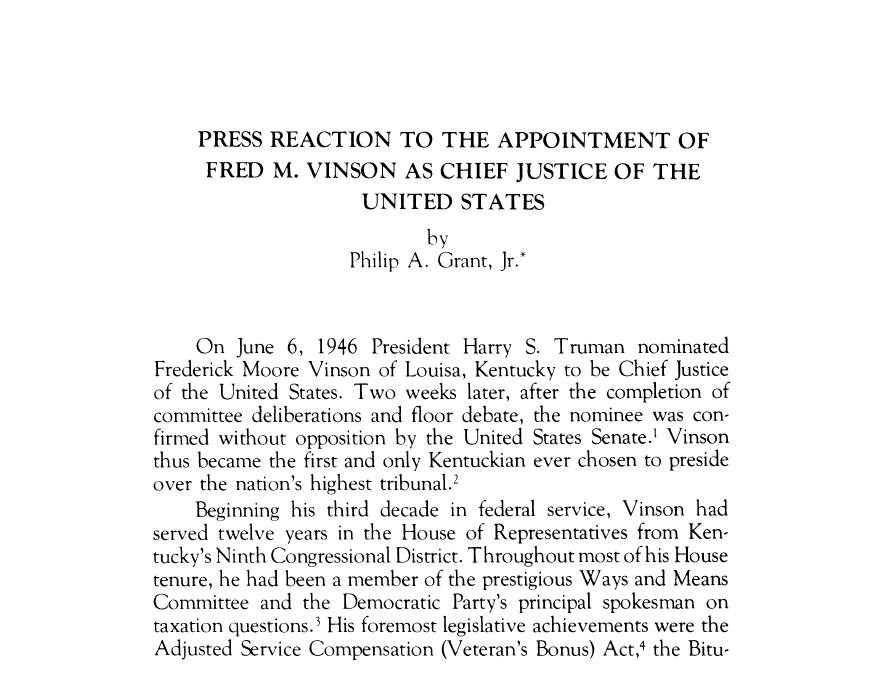PRESS REACTION TO THE APPOINTMENT OF FRED M. VINSON AS CHIEF JUSTICE OF THE UNITED STATES
Periodical
Title: Press Reaction to the Appointment of Fred M. Vinson as Chief Justice of the United States
Author: Philip A. Grant, Jr.
Source: The Register of the Kentucky Historical Society, Vol. 75, No. 4 (October 1977), pp. 304-313
Published by: Kentucky Historical Society
Stable URL: http://www.jstor.org/stable/23378539
The document summarizes media responses to Fred M. Vinson's appointment as Chief Justice. It includes a variety of press opinions, ranging from positive endorsements to critical observations, reflecting the political and judicial implications of his appointment.
Summary
The article discusses the press reaction to President Truman’s nomination of Fred M. Vinson as Chief Justice of the United States in 1946. Vinson, a Kentucky native, had served for twelve years in the House of Representatives and had also served as a judge. At the time of his nomination, he was serving as Secretary of the Treasury.
Newspapers across the country responded to the announcement of Vinson’s nomination. Some newspapers praised Vinson’s experience and predicted that he would be an effective Chief Justice. Other newspapers were more cautious in their appraisal of Vinson, with some expressing doubt as to whether he was the most qualified person for the job.
In the years after Vinson’s appointment, however, many of the newspapers that had initially expressed skepticism about his nomination praised his performance as Chief Justice. During his time as Chief Justice, Vinson presided over cases involving racial equality, internal security, and labor-management relations.
Press Reaction:
Many newspapers praised Vinson's legal expertise, administrative skills, and experience in government.
Some highlighted his political background and questioned whether that might affect his judicial impartiality.
Supporters noted his reputation for fairness, pragmatism, and his ability to unite a divided Court.
Critics expressed concern over his political ties and the potential for ideological influence.
Overall, the reaction reflected cautious optimism mixed with reservations about the political nature of the appointment.
Names
Benjamin H. Bristow: Served as Secretary of the Treasury from 1874-1876.
John Carlisle: Served as Secretary of the Treasury from 1893-1897.
George M. Bibb: Served as Secretary of the Treasury from 1844-1845.
Hugo L. Black: Justice of the Supreme Court.
James Bolner
Edward W. Carter
Calvin Coolidge: Appointed Harlan Fiske Stone as an Associate Justice of the Supreme Court in 1925.
William P. Dillingham
John P. Frank
Woodford L. Gardner, Jr.
Eugene C. Gerhardt
Philip A. Grant, Jr.: Author of the attached article.
James Guthrie: Served as Secretary of the Treasury from 1853-1857.
John M. Harlan: Served as an Associate Justice of the Supreme Court from 1877-1911.
Charles Evans Hughes: Former Chief Justice of the Supreme Court.
Robert H. Jackson: Justice of the Supreme Court.
Alpheus T. Mason
Robert G. McCloskey
Loren Miller
Paul L. Murphy
C. Harman Pritchett
Stanley M. Reed: Served as an Associate Justice of the Supreme Court from 1938-1957.
Fred Rodell
Franklin D. Roosevelt: Appointed Fred M. Vinson as Judge of the United States Court of Appeals for the District of Columbia.
Roy G. and Gladys S. Blakely
Robert Sobel
Harlan Fiske Stone: Former Chief Justice of the Supreme Court.
Thomas Todd: Served as an Associate Justice of the Supreme Court from 1807-1826.
Robert Trimble: Served as an Associate Justice of the Supreme Court from 1826-1828.
Harry S. Truman: President of the United States who nominated Fred M. Vinson to be Chief Justice of the Supreme Court.
Frederick Moore Vinson: Nominated by President Truman to be Chief Justice of the Supreme Court.
Charlotte Williams


